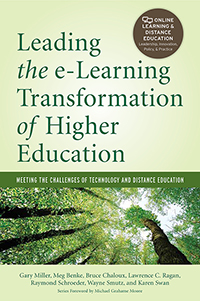
By Gary Miller, Meg Benke , Bruce Chaloux, Lawrence C. Ragan, Raymond Schroeder, Wayne Smutz & Karen Swan
“Leading the e-Learning Transformation of Higher Education” published in 2014 by Stylus Publishing in association with The Online Learning Consortium (formerly Sloan Consortium) is the first book in a planned series about distance education.
Overview The book is current and relevant; “Leading the e-Learning Transformation of Higher Education: Meeting the Challenges of Technology and Distance Education” is an invaluable if not essential resource for leaders and decision makers in online education, though anyone involved with the development or implementation of an online learning strategy for a higher education or K-12 institution will find it an excellent resource. The themes are familiar—e-learning effectiveness and quality, support for faculty success, student success and retention, and the impact of online learning programs has on an institution’s traditional programs. What sets this book apart and makes it exceptionally valuable is the diversity of perspectives from the authors—seven leaders in distance education representing five higher education institutions and the Online Learning Consortium.
The book aims to guide and support leaders as they make decisions about online learning including how to overcome barriers and implement change. The purpose of the text is to provide readers with new perspectives on online program implementation and skill development for approaching education transformation proactively.
Each author brings experience and a perspective to the topic of online learning that gives readers insight into a variety of models and organizational structures for setting up their own online education programs. Organizational structure and culture, influence on traditional institutions are discussed at length, as are standards of quality for online education including the framework for the Five Pillars of quality online education.
Highlights The book is divided into sections categorized by three principal themes: Part One: “Leading Change: Making the Match Between Leadership and Institutional Culture”, Part Two: “Ensuring Operational Excellence” and Part Three: “Sustaining Innovation”. Each features three or four chapters dedicated to a topic that addresses current and real challenges institutions face as they seek to adapt and transform within the constraints of institutional culture, policies and administrative issues. Each offers instructive insights and practical alternatives for consideration. Below I’ve included highlights of one chapter from each section.
In Part One, Chapter Two: “The Impact of Organizational Context” outlines in detail five very different programs of online education in higher education institutions. The five examined: 1) The Pennsylvania University World Campus, 2) University of Illinois at Springfield, 3) Empire State College, 4) Rio Salado College and 5) the American Public University System. The leaders’ views are examined within each of the programs’ institutions on the leadership challenges, culture shifts, attitudes of faculty and impact of business models. The leaders’ responses in comparison with each other is instructive and enlightening.
In Part Two, Chapter Six: “Supporting Faculty Success” suggests that the skills and competencies required by faculty are contextualized to the culture, practices and administrative structure of the online initiative of the institution. I agree with the authors— culture and administrative structure pose a significant barrier in many instances. There is gap between what is needed and what most institution provide in the way of support and skill development for faculty and instructors teaching online. This issue, the chapter emphasizes, is central to effective online education delivered by an institution.
The challenge for the institutions is to understand and address the needs of the online instructor and create appropriate programs and support services and policies that help develop the competencies necessary for online teaching success (p. 109)
In Part Three, Chapter Ten: “Policy Leadership in e-learning” discusses the multiple challenges e-learning growth has had on policy at the federal, state and institutional level. Policy remains a barrier and threat to the growth and success of e-learning the authors’ state, and they outline five policy issues that pose real barriers to online education now, that have emerged within the past ten years. The five identified and discussed are: 1) tuition, 2) transfer credit, 3) state and campus budgeting and allocation, 4) federal and state financial aid, and 5) student support services.
Closing No doubt, one can see the value this book holds for leaders of e-learning education. What’s also helpful to the reader is the organization of the book, which makes it unnecessary to read it from beginning to end; readers can choose to read chapters of interest and relevance. Though I suggest that all chapters are relevant to anyone involved in online education programming.
Resources:
- “Leading the e-Learning Transformation of Higher Education”, Stylus Publishing LLC.
- Download of chapter one available in PDF via the publisher’s webpage: click here
- The Online Learning Consortium
Thanks for sharing this useful information. The content of this book is so good and readable its informative for all type of instructor, teachers specially online persons. As a teacher and a online helper it is necessary that he must know about the upcoming method and current methods of teaching through online resources and that’s all be found in this book its really so good.
LikeLike
Thanks again Debbie for providing us with great resources! I picked up a copy of the book to read on the airplane next week as I head to a conference to speak about online teaching methods.I’m going with my assistant dean, so I’m sure we’ll be talking about what I learn from the book. I’ll also be giving a plug for your blog in my presentation :).
LikeLike
Hi Andrew.
So nice to hear from you again! Glad you found the review helpful. Let me know what you think of the book. Best wishes for your presentation at the conference.
Debbie
LikeLike